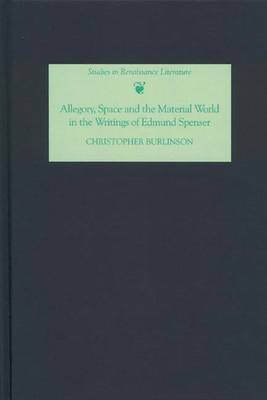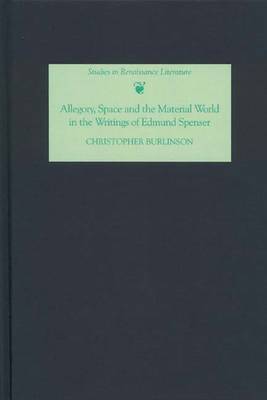
Bedankt voor het vertrouwen het afgelopen jaar! Om jou te bedanken bieden we GRATIS verzending (in België) aan op alles gedurende de hele maand januari.
- Afhalen na 1 uur in een winkel met voorraad
- In januari gratis thuislevering in België
- Ruim aanbod met 7 miljoen producten
Bedankt voor het vertrouwen het afgelopen jaar! Om jou te bedanken bieden we GRATIS verzending (in België) aan op alles gedurende de hele maand januari.
- Afhalen na 1 uur in een winkel met voorraad
- In januari gratis thuislevering in België
- Ruim aanbod met 7 miljoen producten
Zoeken
Allegory, Space and the Material World in the Writings of Edmund Spenser
Christopher Burlinson
€ 177,45
+ 354 punten
Omschrijving
This book provides a radical reassessment of Spenserian allegory, in particular of Spenser's poem, The Faerie Queene, in the light of contemporary historical and theoretical interests in space and material culture. It explores the ambiguous and fluctuating attention to materiality, objects, and substance in the poetics of The Faerie Queene, and discusses the way that Spenser's creation of allegorical meaning makes use of this materiality, and transforms it. It suggests further that a critical engagement with materiality [which has been so important to the recent study of early modern drama] must come, in the case of allegorical narrative, through a study of narrative and physical space, and in this context it goes on to provide a reading of the spatial dimensions of the poem - quests and battles, forests, castles and hovels - and the spatial characteristics of Spenser's other writings. The book reaffirms the need to place Spenser in his historical contexts - philosophical and scientific, military and architectural - in early modern England, Ireland and Europe, but also provides a critical reassessment of this literary historicism. Dr CHRISTOPHER BURLINSON is a Research Fellow in English at Emmanuel College, Cambridge.
Specificaties
Betrokkenen
- Auteur(s):
- Uitgeverij:
Inhoud
- Aantal bladzijden:
- 274
- Taal:
- Engels
- Reeks:
- Reeksnummer:
- nr. 17
Eigenschappen
- Productcode (EAN):
- 9781843840787
- Verschijningsdatum:
- 20/07/2006
- Uitvoering:
- Hardcover
- Formaat:
- Genaaid
- Afmetingen:
- 162 mm x 235 mm
- Gewicht:
- 653 g

Alleen bij Standaard Boekhandel
+ 354 punten op je klantenkaart van Standaard Boekhandel
Beoordelingen
We publiceren alleen reviews die voldoen aan de voorwaarden voor reviews. Bekijk onze voorwaarden voor reviews.









